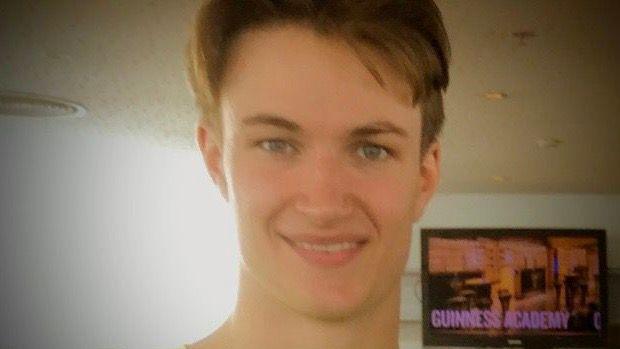Council policy changed after swimmer's death

Christopher Rogers was 20 when he died at the Orchard Leisure Centre in Armagh in April 2017
- Published
A council policy over underwater swimming changed after a man's death at a leisure centre pool in Armagh, a court heard on Monday.
Christopher Rogers, who was 20, died during a swim session at the Orchard Leisure Centre in April 2017.
Cathal Peter Forrest McVeigh, 35, of Dunamony Road in Dungannon, James Monaghan, 26, of Folly Lane in Armagh and William Holden, 26, of Unshinagh Lane in Portadown were on duty the night Mr Rogers died.
The charge against them stated that "being an employee, [they] failed to take reasonable care for the health and safety of other persons who may be affected by [their] acts or omissions at work".
Newry Crown Court previously heard that on the day of his death Mr Rogers had been swimming underwater for about a minute before breaking the water's surface.
He then descended to the bottom of the pool and lay there for five minutes and 14 seconds before a rescue attempt was made.
He was later pronounced dead.
A coroner said he had lost consciousness due to a lack of oxygen.
Paul Murphy, a former swimming instructor at the centre who also trained and assessed the lifeguards, told the court that training was based on guidance from the Royal Life Saving Society (RLSS) book and that the syllabus was revised every 18-24 months.
Outlining the RLSS syllabus, he said there was no reference to - and lifeguards were not receiving training for - "shallow water blackout" in 2017.
Under cross examination, Mr Murphy also agreed that after Mr Rodgers' death there was a policy change for pools across the council area.
This meant swimmers were not allowed to swim for more than 15m underwater.
'Prolific swimmer'
The court also heard evidence from Doris Sherry, who was the duty officer at the centre in charge of staff induction.
She agreed that at the time, the RLSS book, which was the basis for pool lifeguard training "did not mention shallow water blackout or hypoxic blackout or anything like that".
She also said she knew Mr Rogers as an "athletic" and "prolific swimmer".
Ms Sherry also confirmed he was a lifeguard "and would have received the same standard training" as the defendants in assessing potential dangers and hazards.
The trial continues.